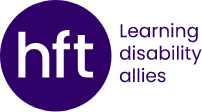2019-09-20 09:56:48
National learning disabilities charity, Hft and leading Connected Care & Health provider Tunstall Healthcare, have issued a joint submission to a House of Lords Science & Technology Committee inquiry into Ageing: Science, Technology and Healthy Living, showcasing the positive benefits a learning disability Sector Deal could bring to working age adults with a learning disability.
The joint submission to the Committee, whose call for evidence closes today (20th September), highlighted how assistive technologies, such as telecare, have traditionally been geared towards older people. However, there are significant applications for working age adults with learning disabilities, which Hft and Tunstall believe are not currently being realised to its full potential.
Earlier this year (July 2019), the two organisations published their report Improving Outcomes, Enhancing Care: Assistive technologies and the case for a Sector Deal for the learning disability sector. The report, officially launched at the House of Lords, highlights the challenges faced by a social care sector in financial crisis at a time when demand is growing. Hft and Tunstall believe the successful negotiation of a learning disability Sector Deal would enable effective investment that could unlock the potential of assistive technologies. In turn, stimulating innovation and investment in future services, bringing financial sustainability to providers within the sector, and ultimately delivering enhanced outcomes for people with learning disabilities.
Billy Davis, Hft’s Public Affairs and Policy Manager, hopes that their submission will widen attention beyond support for older people:
“While much of the policy debate has focused on support for the over-65s, the learning disability sector actually accounts for around a third of adult social care spend in England and demand is growing rapidly as life expectancy increases.
“With the funding crisis affecting the sustainability of adult social care, providers and the government must come together to successfully negotiate a learning disability Sector Deal.
“Assistive technology has a key part to play in bridging that gap. Effective investment could transform the way support is delivered to people with learning disabilities and increase their independence, ultimately freeing up staff to focus on more meaningful support.
“We believe a Sector Deal will stimulate investment and innovation and ultimately deliver improved outcomes for the people supported by the sector. This is why we have submitted evidence to this important inquiry. We look forward to reading the Committee’s conclusions in due course.”
Gavin Bashar, Managing Director UK & Ireland, Tunstall Healthcare commented:
“We support millions of people around the world, using technology as part of person-centred services to enable independence and freedom. However, not enough people with learning disabilities are currently benefitting from the advantages that assistive technology (also known as telecare) can bring. Tunstall is proud to support the Sector Deal proposal, and we hope our evidence to the Committee demonstrates how technology can help us create a better future for people with learning disabilities in the UK.”
Notes to editors
For further information please phone 0117 906 1697 or email media.enquiries@hft.org.uk.
About Hft
Hft is a national charity supporting more than 2,900 adults with learning disabilities across England and Wales to live the best life possible. Established in 1962, the charity uses its own unique Fusion Model to consistently deliver high quality, person-centred support across all its services.
Services range from supported living to residential care – from a few hours a week to 24 hours a day. Hft also helps people with learning disabilities to take part in daily activities, make friends and develop relationships and to find work.
For more information about Hft please visit www.hft.org.uk
Information about learning disabilities
A learning disability can be mild, moderate, severe or profound and is defined as having a reduced ability to:
- Understand new or complex information
- Learn new skills
- Live independently
For more information about learning disabilities, please visit www.hft.org.uk/resources-and-guidance
About Tunstall Healthcare
Tunstall has been at the forefront of technology innovation for the health, housing and social care markets for over 60 years. Its pioneering software, hardware and services enable new delivery models which can transform community-based health and social care, and enable people to live independently and with an improved quality of life.
Tunstall’s Connected Care and Health solutions are underpinned by IP enabled platforms and infrastructure, supporting the innovative use of technology including IoT, SaaS and cellular communications. It offers an end-to-end solution, including training and consultancy, service and maintenance, and monitoring services which make more proactive and personalised models of care possible, and focus health and care teams where they are most required.
Tunstall works with social care providers, healthcare services, retirement living providers, and nursing and care organisations in 38 countries, improving the lives of millions of people, including those living with dementia, learning disabilities, physical disabilities and long-term health conditions.





